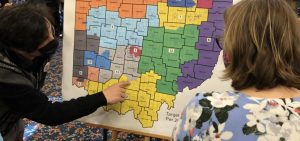News
Ohio’s attorney general rejects language for the political mapmaking reform amendment a second time
By: Julie Carr Smyth | AP
Posted on:
COLUMBUS, Ohio (AP) — The Ohio Attorney General’s Office again rejected petition language Thursday for a constitutional amendment aimed at remaking the state’s troubled system for political mapmaking, frustrating the effort’s backers.

He said because a key feature of the new citizen-led redistricting commission would be political balance, “how political affiliation is determined, who makes those determinations and what rules apply are critical issues that must be included in a summary of the proposed amendment if it is to be fair and truthful.”
The group, which includes two former Ohio Supreme Court justices, aims to place the proposal on next year’s fall ballot. A spokesman said they will collect more signatures and keep trying.
“We are disappointed and frustrated that the Attorney General has chosen to reject our petition summary for a second time,” a statement said. “We adjusted our summary language as the Attorney General requested on the first submission, and we know our summary language was accurate.”
The back-and-forth is taking place as Ohio’s existing mapmaking process has been stymied by political infighting.
Late Thursday, Republican Gov. Mike DeWine canceled a meeting of the Ohio Redistricting Commission because GOP legislative leaders had not yet been able to agree on who to appoint as their party’s co-chair.
Democrats on the panel say they are ready to name their co-chair appointee and simply are waiting for Republicans to work out their differences.
The ballot proposal would call for replacing that commission, which currently comprises three statewide officeholders and four state lawmakers, with an independent body selected directly by citizens.
The effort follows the repeated failure under the existing structure to produce constitutional maps. Courts rejected two congressional maps and five sets of Statehouse maps as gerrymandered. Amid the court disputes, Ohio’s elections were allowed to proceed last year under the flawed maps.
A 15-member citizen panel of Republicans, Democrats and independents representing a geographic and demographic cross-section of the state, called the Ohio Citizens Redistricting Commission, would take over the process under the proposed amendment.
The two former Supreme Court justices who are part of Citizens Not Politicians are retired Chief Justice Maureen O’Connor, a Republican; and Yvette McGee-Brown, a Democrat. While still on the court, O’Connor cast repeated swing votes to rule that the maps unconstitutionally benefited Republicans, siding with the three Democrats.

